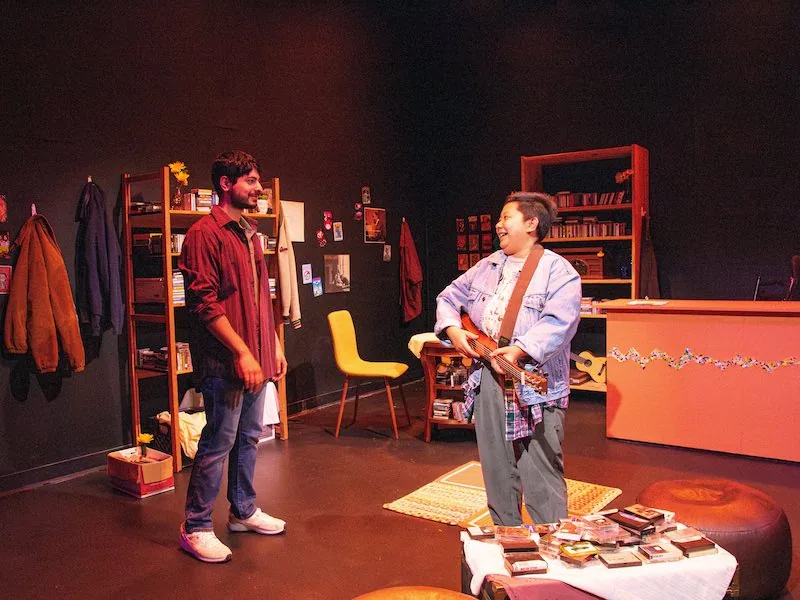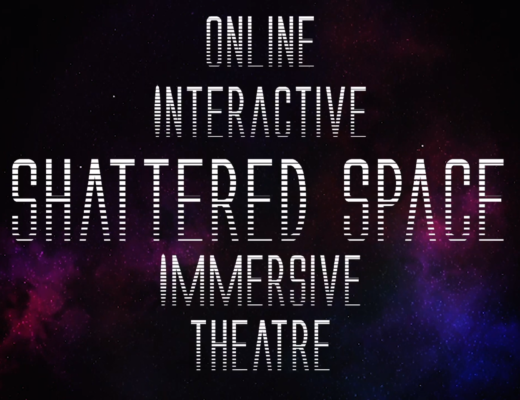By Jakob Cansler
This article was originally published in DC Theater Arts here.
There is perhaps nothing with a more transportive effect than music. It has the power to conjure memories long forgotten, to blend the past with the present, to transcend reality. For those seeking asylum — people who have been forced to leave their old lives, but whose new lives have not officially begun — that effect can be particularly powerful. It is not only transportive but humanizing.
That effect is central to Theatre Prometheus’ production of The Cassette Shop, a new play devised by Asif Majid and the Storytellers, a group of local asylum seekers. Now in performances at Anacostia Arts Center through May 20, The Cassette Shop is better in concept than in execution, but nevertheless reveals the humanity of people who are so often dehumanized.
The Cassette Shop centers on two asylum seekers, Alé (Shan Khan) and Luciar (Kartika Hanani). Set entirely in Alé’s vintage Cassette Shop in Montana, the two quickly form a connection over their shared experience and love for music. The play follows their present friendship along with their past lives, which are revealed through monologues between scenes, in which they are transported through music into their memories.
Those monologues are taken verbatim from interviews with real people seeking asylum in the DC area. For this production, Theatre Prometheus partnered with AsylumWorks, a nonprofit that helps asylum seekers in the area rebuild their lives here. Majid and dramaturg Sarah Priddy interviewed asylum seekers, after which Majid used the transcripts from those interviews as the basis for this play. As a result, The Cassette Shop serves as both a form of community-building and as a megaphone for people whose stories are often not heard.
Most important, many of the stories featured in The Cassette Shop are not about the process of seeking asylum but instead focus on memories from home countries, defining people by the lives they have lived and are living, rather than by the legal status they are seeking. Majid’s script does an effective job of blending those interviews with the story of Alé and Luciar, communicating the experience of feeling stuck between lives via embodied memories.
As a concept and as words on paper, the potential for The Cassette Shop to be a unique storytelling experience is high. As a performance, Theatre Prometheus’ production, directed by Lauren Patton Villegas, unfortunately never reaches that potential.
Specifically, sluggish pacing holds The Cassette Shop back from communicating the emotional tension and personal conflict that builds throughout the play. One particularly climactic moment toward the end of the play never feels quite like a peak, leaving what could be the most heartrending moment of the play unrealized.
Shan Khan as Alé and Kartika Hanani as Luciar in ‘The Cassette Shop.’ Photo by Barbara Fluegeman.
Conservative staging choices, as well, mean that the performers spend virtually the entire play standing still. That could be an effective choice with highly skilled actors. In this case, though, more dynamic movement — or even abandonment of realistic movement entirely, during some sections — could give the performances the boost they need to be compelling.
The Cassette Shop does get a boost from some design choices. Specifically, Nitsan Scharf’s stunning projection design translates the transportive effect of music into a visual format, creating an all-encompassing world for the performers to share memories with the audience. Hailey LaRoe’s evocative lighting design, too, helps to differentiate the realism of the main story from the emotive world of memory.
It is in that emotive world, the moments in which the characters are transported back to their old lives through music, that this production gets the closest to the poignancy it seeks. Those moments also serve as a reminder of what this show could potentially be, and given its political and social weight, I look forward to seeing The Cassette Shop reach that potential in the future.





No Comments